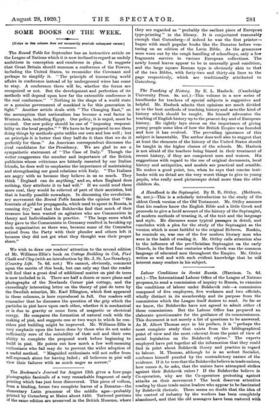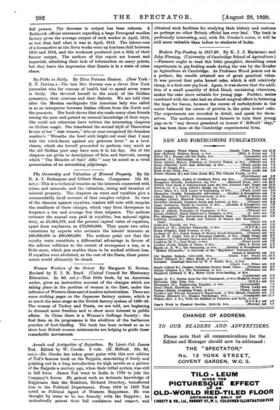Labour Conditions in Soviet Russia. (Harrison. 7s. 6d. net.)—The International
Labour Office of the League of Nations proposes.to send a commission of inquiry to Russia, to examine the conditions of labour under Bolshevik rule—a commission composed of five employers, five workmen and two officials, wholly distinct in its membership and its purpose from the commission which the League itself desires to send. So far as we know, the Bolsheviks have not agreed to admit either cf these commissions. But the Labour Office has prepared an elaborate questionnaire for the guidance of its commissioners. This document is not merely a list of questions to be answered. As M. Albert Thomas says in his preface, it is " perhaps the most complete study that exists from the bibliographical point of view and the most coherent from the point of view of social legislation on the Bolshevik regime." The experts employed have put together all the information that they could fmd in print about Bolshevik theory and practice in regard to labour. M. Thomas, although ho is an ardent Socialist, confesses himself puzzled by the contradictory nature of the evidence. If it be true that the Bolsheviks believe in trade unions, how comes it, he asks, that the unions have attempted strikes against their Bolshevik rulers ? If the Bolsheviks believe in Co-operation, why are the Co-operators protesting against attacks on their movement ? The book deserves attentive reading by those trade union leaders who appear to be fascinated by Bolshevik rhetoric. There seems no doubt that the idea of the control of industry by the workers has been completely abandoned, and that the old managers have been restored with
full powers. The decrease in output has been ruinous. A Bolshevik official statement regarding a large Petrograd woollen factory gives the average output of each worker in April, 1918, as less than half what it was in April, 1913. The labour-cost of a locomotive at the Neva works went up fourteen-fold between 1916 and 1918, and the workmen produced just a fifth of their former output. The authors of this report are honest and impartial, admitting their lack of information on many points, but they leave the impression that Russia is in a state of utter chaos.



































 Previous page
Previous page